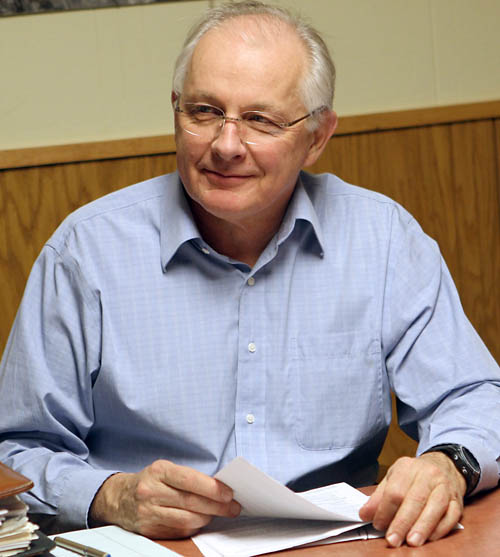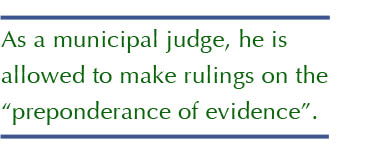home | internet service | web design | business directory | bulletin board | advertise | events calendar | contact | weather | cams

|
Quiet Justice David Ebenger is doing a job in the Methow Valley that many citizens don’t even know exists - until they get a traffic ticket from local cops or violate a town noise or nuisance ordinance. Ebenger, a municipal court judge, has spent 30 years holding court in Twisp and 12 years in Winthrop. He reckons that he’s sat in judgment of thousands of people here and in other towns since he started meting out justice.  Local attorney David Ebenger is the municipal judge for Winthrop, Twisp, Brewster and Omak. He holds court once a month. Local attorney David Ebenger is the municipal judge for Winthrop, Twisp, Brewster and Omak. He holds court once a month.Non-criminal local infractions are the purview of municipal judges, so he’s Municipal courts can adjudicate infractions only, according to Ebenger, but cannot accept any criminal, civil or small claims cases. Those are handled at the Okanogan County Courthouse in Okanogan, either in district or superior court. Ebenger, a Winthrop attorney, is also the municipal judge for both towns and for Brewster and Omak, where he is hired for four-year terms. He also serves as judge pro tem in the county’s district and superior court. He holds court the afternoon of each fourth Thursday of the month in the Twisp Town Council chambers and in the early evening the same day in a small room at Winthrop Town Hall. “All these little towns used to have jails,” says Ebenger, who arrived in the valley in 1972 with valley native Joyce Daniels, his former wife. Ebenger only deals with traffic tickets issued by local police. Those issued within Twisp or Winthrop town limits by a county sheriff’s deputy or a Washington State Patrol officer are sent to Okanogan to be dealt with in that jurisdiction, says Ebenger. That arrangement means loss of traffic fine revenue for the towns of Twisp and Winthrop, which are entitled to keep a percentage of any fines levied in their towns. Ebenger, 66, dispenses justice in modest, low-key settings; there’s none of the full-dress gaveling the court to order or black-robed pomp of a courthouse trial. Usually the proceedings consist of the judge, the defendant, and the clerk of the court - Leanne Melton in Winthrop, Vicki Hallowell in Twisp.. Still, Ebenger says it’s important that citizens who appear before his court are treated with the impartiality and fairness they would expect from a higher court. Of the three branches of government, says Ebenger, the one citizens are most likely to have personal contact with is the judicial. He says he believes that giving defendants fair treatment when they are in court “is a keystone to the continued support of the government by the citizens.” In municipal court defendants can plead guilty, contest the hearing - which means “agreeing you did it but you want to tell your story” - or enter a non-guilty plea, according to Ebenger. As a municipal judge, he is allowed to make rulings on the “preponderance of evidence”; a higher standard of proof prevails in criminal cases, which require “proof beyond a reasonable doubt.”  The local municipal courts have no connection with the county, according to Ebenger. He answers to the state’s Administrative Office of the Courts in Olympia. Ebenger was born, and grew up, in Ohio, where he got his law degree from the University of Cincinnati College of Law. Graduating with a rank of second lieutenant in the army reserves, he was expecting to be inducted into active duty upon graduation. Instead, the Vietnam War was winding down and his services were no longer required. “The two years of life I thought I owed to the military were handed back to me,” Ebenger says, and he felt he should spend them doing some type of public service. So he became a volunteer with the federal VISTA anti-poverty organization and was assigned to provide legal services in Moses Lake, Washington, where he met his wife. After they moved here, he spent three years as a public defender in Okanogan County. “The smaller the town, the more [police] officer discretion is exercised, generally,” says Ebenger when asked to describe his typical caseload. If police are aggressive in issuing citations, his workload goes up. In Winthrop and Twisp, typically he will have from one or two to sometimes as many as half a dozen cases to deal with per court session, he says. “Police in smaller towns try to work with people,” he adds. And Ebenger says he does, too, preferring to create a sense of “community rather than conflict” when adjudicating cases. His approach is to get people into compliance with the law, he says—get the legally required auto insurance, license tabs, and so on. And when he rules against someone, it’s important to say why, Ebenger stresses. “You have to explain your decision.” 1/3/2014 Comments
|